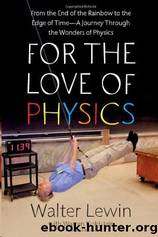For the Love of Physics by Walter Lewin

Author:Walter Lewin [Lewin, Walter]
Language: eng
Format: epub
Tags: Biography & Autobiography, Science & Technology, Science, General, Physics, Astrophysics, Essays
ISBN: 9781451607130
Google: xkgzB5kGGwkC
Amazon: 145160713X
Publisher: Free Press
Published: 2012-02-06T16:00:00+00:00
CHAPTER 8
The Mysteries of Magnetism
For most of us magnets are just fun, partly because they exert forces that we can feel and play with, and at the same time those forces are completely invisible. When we bring two magnets close together, they will either attract or repel each other, much as electrically charged objects do. Most of us have a sense that magnetism is deeply connected to electricityânearly everyone interested in science knows the word electromagnetic, for instanceâbut by the same token we canât exactly explain why or how theyâre related. Itâs a huge subject, and I spend an entire introductory course on it, so weâre just going to scratch the surface here. Even so, the physics of magnetism can lead us pretty quickly to some eye-popping effects and profound understandings.
Wonders of Magnetic Fields
If you take a magnet and put it in front of an older, pre-flat-screen television when itâs turned on, youâll see some very cool patterns and colors across the screen. In the days before liquid crystal display (LCD) or plasma flat screens, beams of electrons shooting from the back of the TV toward the screen activated the colors, effectively painting the image on the screen. When you take a strong magnet to one of these screens, as I do in class, it will make almost psychedelic patterns. These are so compelling that even four-and five-year-olds love them. (You can easily find images of these patterns online.)
In fact, children seem to discover this on their own all the time. Anxious parents are all over the web, pleading for help in restoring their TVs after their children have run refrigerator magnets across the screens. Fortunately, most TVs come with a degaussing device that demagnetizes screens, and usually the problem goes away after a few days or a few weeks. But if it doesnât, youâll need a technician to fix the problem. So I donât recommend you put a magnet near your home TV screen (or computer monitor), unless itâs an ancient TV or monitor that you donât care about. Then you might have some fun. The world-famous Korean artist Nam June Paik has created many works of art with video distortion in roughly the same way. In my class I turn on the TV and pick out a particularly awful programâcommercials are great for this demonstrationâand everyone loves the way the magnet completely distorts the picture.
Just as with electricity, magnetismâs history goes back to ancient times. More than two thousand years ago the Greeks, the Indians, and the Chinese apparently all knew that particular rocksâwhich became known as lodestonesâattracted small pieces of iron (just as the Greeks had found that rubbed amber would collect bits of leaves). Nowadays we call that substance magnetite, a naturally occurring magnetic mineral, in fact the most magnetic naturally occurring material on Earth. Magnetite is a combination of iron and oxygen (Fe3O4) and so is known as an iron oxide.
But there are lots of different kinds of magnets, not only magnetite. Iron has played
Download
This site does not store any files on its server. We only index and link to content provided by other sites. Please contact the content providers to delete copyright contents if any and email us, we'll remove relevant links or contents immediately.
The Complete Stick Figure Physics Tutorials by Allen Sarah(7369)
Secrets of Antigravity Propulsion: Tesla, UFOs, and Classified Aerospace Technology by Ph.D. Paul A. Laviolette(5370)
Thing Explainer by Randall Munroe(3932)
The River of Consciousness by Oliver Sacks(3601)
The Order of Time by Carlo Rovelli(3191)
How To by Randall Munroe(3109)
A Brief History of Time by Stephen Hawking(3023)
I Live in the Future & Here's How It Works by Nick Bilton(2996)
What If?: Serious Scientific Answers to Absurd Hypothetical Questions by Randall Munroe(2702)
The Great Unknown by Marcus du Sautoy(2693)
Midnight in Chernobyl by Adam Higginbotham(2548)
Blockchain: Ultimate Step By Step Guide To Understanding Blockchain Technology, Bitcoin Creation, and the future of Money (Novice to Expert) by Keizer Söze(2496)
Networks: An Introduction by Newman Mark(2405)
The Meaning of it All by Richard Feynman(2355)
Easy Electronics by Charles Platt(2327)
The Tao of Physics by Fritjof Capra(2273)
Midnight in Chernobyl: The Untold Story of the World's Greatest Nuclear Disaster by Adam Higginbotham(2229)
Introducing Relativity by Bruce Bassett(2121)
When by Daniel H Pink(2116)
